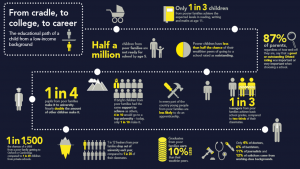Educational inequality is a huge problem throughout our education system. At primary school, only 1 in 3 children from poorer families achieves the expected levels in reading, writing and maths at age 11. At secondary school, 33% of pupils on Free School Meals achieved 5 A*-Cs at GCSE compared to 60.5% of all other pupils. Of these students, 1 in 4 make it to university compared to nearly double the amount of all other students. These students have a 1 in 1500 chance of making it into Oxford or Cambridge whereas 1 in 20 students from private schools go on to study at these universities.[1]

I’m working with an educational charity called Team Up whose mission is to help end educational inequality by delivering tuition in Maths and English to students from low-income backgrounds. They do this using a team of volunteer tutors. As one of these tutors over the past year, I have witnessed first-hand how the programmes that Team Up run can influence students, by both helping them to improve their grades and providing them with a role model to inspire them.
My project is focused on developing Team Up’s maths curriculum. The tutors are provided with lesson plans and student worksheets for the tuition sessions. As well as this, students on the programmes sit baseline and progress tests to assess their knowledge and development. My job is to assess the effectiveness of these current resources and develop them further. This will allow the programmes and individual sessions to run more smoothly, allowing both the student and tutors to get the most out of their time with Team Up.